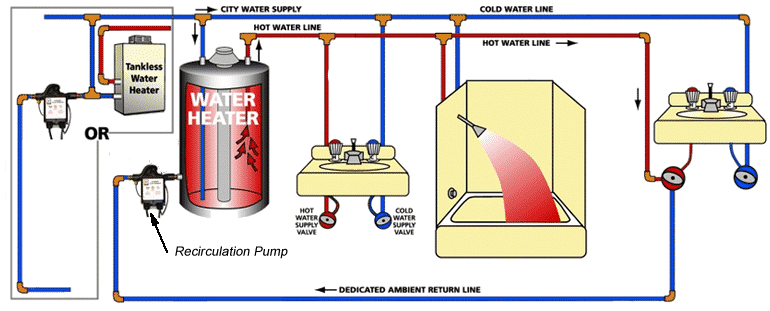If you’re not familiar with a hot water recirculating pump – it’s a system that pumps hot water quickly to faucets. Without it, it can take a while for running water in your home to become hot.
As with all plumping appliances, however, there are things to consider before buying. Here are a few pros and cons of hot water recirculating pumps:

Advantages of Hot Water Recirculating Pumps
Access hot water quickly
No more will you have to wait in frustration with the faucet running as the hot water takes its own sweet time to arrive. Turn the faucet, and it’s there instantly – perfect if you’re an eco-conscious individual.
Conserve water
Building from the previous point, you can save hundreds to thousands of gallons of water each year with a hot water recirculating pump, because it wastes zero water while waiting for it to turn hot.
Save time
It might have come off as a bit ‘silly’ to think that a hot water recirculating pump may save you time – but if you think about the 1-2 minute spent waiting every time for the hot water to arrive – it’s easy to see how much time you can save in an entire week or year.
Easy operation
Hot water recirculating pumps are just as easy to use as they are to install. Even service and maintenance is straightforward and trouble-free. Many models are automated, which means you can begin operation with a button press or two.
Advanced technology gives you more control
The newest hot water recirculating pumps come with sensors and timers that tremendously add to the ‘value for money’ factor. And the best models last for years on end with very little to no maintenance.
Disadvantages of Hot Water Recirculating Pumps
Requires too much power
As time-saving hot water recirculating pumps are, they can consume a lot of electricity and gas, even if they’re rated as ‘energy efficient.’ You may have to keep an eye on your utility bills and switch the pump off when you don’t need it.
Possible corrosion
Bends and elbows of standard-quality piping systems are often prone to deterioration and corrosion. With a hot water recirculating pump, the additional pressure can increase the rate of corrosion and even cause pipes to rupture.
Sensor valve costs can be high
Your pump will not last forever, an inevitable reality for everything installed in your home, even if they come with extended warranties and advertised shelf life. Some homeowners have reported that the sensor valve on their hot water recirculating pump needs to be replaced every two years, although this may vary from model to model.
Possible heat losses
Unless the return pipes have proper, good-quality insulation, heat can escape. An unfortunate consequence of this is energy waste means larger than usual bills. Fortunately, you can minimize this by correctly isolating the pipes and plumbing.
Coldwater may take a while to arrive
It may be a while before cold water enters with the heater on your pump running.
Consider the above pros and cons of hot water recirculating pumps before deciding to buy one, so that you don’t have any buyer’s remorse later.
- Tulip Mania – The Story of One of History’s Worst Financial Bubbles - May 15, 2022
- The True Story of Rapunzel - February 22, 2022
- The Blue Fugates: A Kentucky Family Born with Blue Skin - August 17, 2021